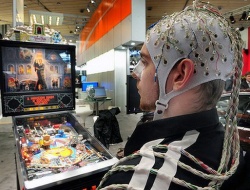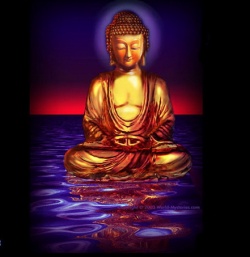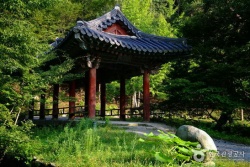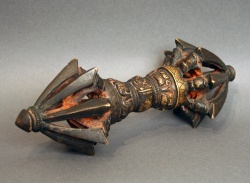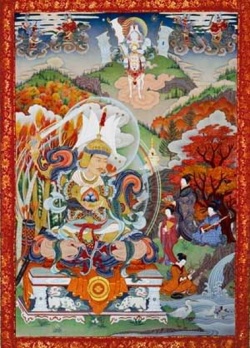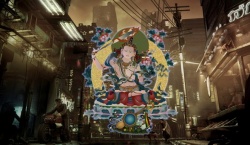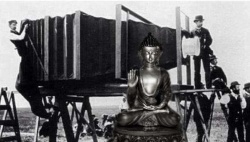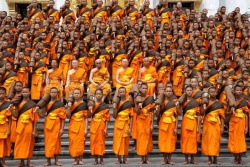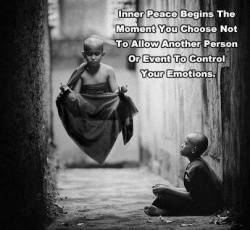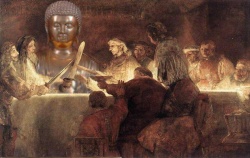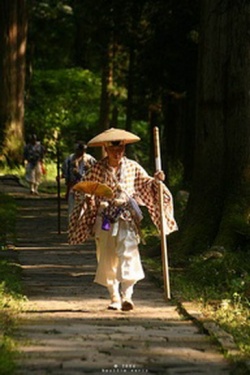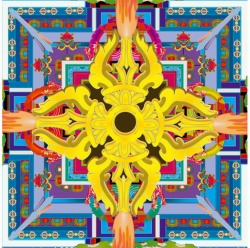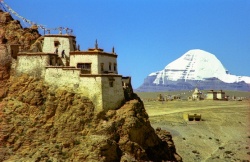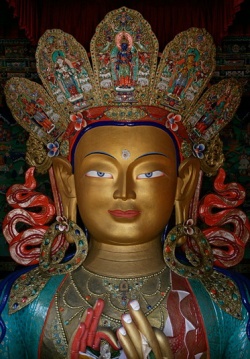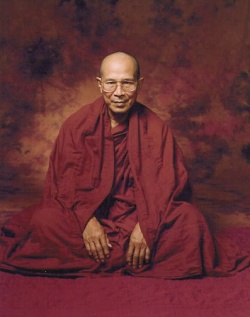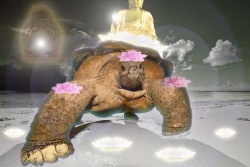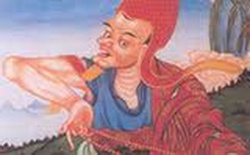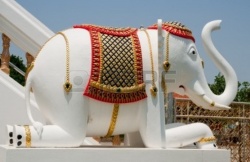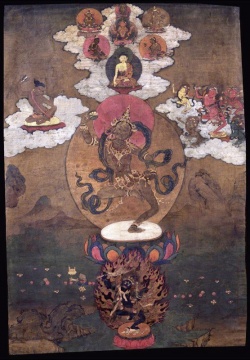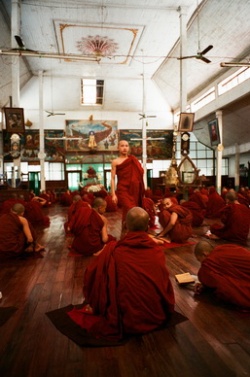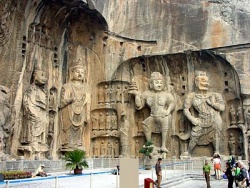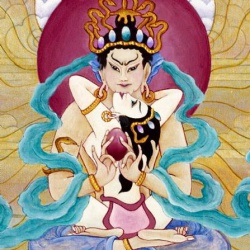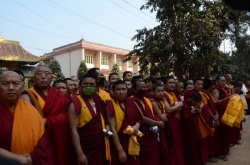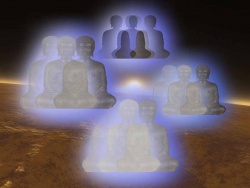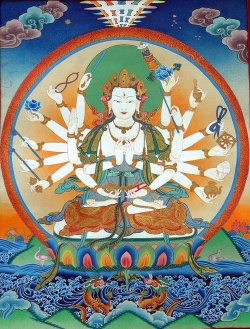Ten Eminent Disciples of the Buddha
Ten Eminent Disciples of the Buddha
(by Hon Sing Lee, Oct 13,2002)
This is a translation from a Chinese book of similar title written by Reverend Xing Yun. The following is only about ten percent of the entire book. There are many other interesting stories in the book.
We heard stories about the Buddha, but little did we hear about his 10 eminent disciples. Tonight by recounting and rejoicing in their deeds, we celebrate their merits and contributions in the earliest days of Buddhism.
Sariputra (Also Sariputta, Upatissa, foremost in wisdom)
Sariputra was born to a Brahmin family of great theorists. He displayed great wisdom since a young age. At 20, he left home to seek out great teachers. He became friend with Mogallana.
Both of them were so wise that they thought no one could qualify to be their teacher!
Later he heard about Buddha's teaching on impermanence and dependent origin, and realized that he had finally found a suitable teacher.
Both of them together brought 2 hundred disciples to follow Buddha.
Sariputra attained Enlightenment 7 days after following Buddha.
He became the chief disciple of Buddha. In the early days, Sariputra was always standing on the right of Buddha while Mogallana on the left.
His wisdom was beyond all others except Buddha.
He supervised the construction of the first Monastery in Jeta Grove.
This construction was plagued with many intellectual challenges from other religions, but Sariputra out debated them all.
Sariputra frequently appeared in many sutras.
Among the Mahayana sutras are The Sutra on the Western Paradise, and The Heart Sutra.
Sariputra passed away peacefully, at his home town, a few months before Buddha.
When his ashes was taken to Buddha, Buddha praised that Sariputra as the foremost in wisdom among his disciples.
Mogallana (Also Moggallana, Maha-Maudgalyayana, foremost in possessing supernatural powers)
Mogallana followed the Buddha together with Sariputra.
Mogallana gained Enlightenment within 7 days and attained supernatural powers.
Why did Mogallana have such great supernatural powers?
This is because in a previous live, Mogallana gave a treat to a Pacceka Buddha.
The Pika Buddha was not very eloquent in explaining the Dharma through words, hence he illustrated using supernatural powers. Mogallana was impressed and vowed that he too would achieve in supernatural powers to propagate the Dharma.
Supernatural powers were quite common among Buddha's disciples.
However the display of it was always discouraged by the Buddha, all except for Mogallana, he was even praised for using supernatural powers in propagating the Dharma. There were many interesting stories, including one giving rise to the Buddhist festival of Ullambana.
However I shall mention one that is less heard of.
There was once where Kapilavastu was to be attacked by King Virudhara from the Kingdom of Kosala King.
Buddha tried to prevent the war by sitting at the pathway leading to Kapilavastu on 3 separate occasions.
King Virudhara always retreated whenever he saw Buddha. However King Virudhara's revenge and hatred could not be subdued. Buddha knew that there was no way to prevent the Karma further, thus he left them alone.
Mogallana had been successful in all his supernatural powered deeds. Hence he thought that more could be done in this case. Buddha explained to him that this was due to the past bad Karma of the people in Kapilavastu.
The people remained arrogant, non-rependent, deceitful, and did not amend their ways, hence there was no way of substituting the fruits of Karma. Mogallana was unconvinced.
The army surrounded Kapilavastu such that no one could escape.
Mogallana used his supernatural powers to fly into the city, found 500 great men, transform them into his alms bowl, and flew out of the city to a safe spot. However when he opened the bowl to recover the men, he found a bow of blood water instead!
Mogallana realized that supernatural powers cannot overcome Karma. (For more details, check out here for more details: http://www.geocities.com/Tokyo/Courtyard/1652/Massacre.html.)
This was a lesson for Mogallana.
Finally one day Mogallana was ambushed by some Jain followers.
They pushed rocks from a hill onto Mogallana.
Mogallana knew this was his Karma and he did not use supernatural powers to overcome it. He died under the rocks. This was before Buddha's final Nirvana.
===Katyayana (foremost in spreading the Dharma)===
Katyayana was born to a rich family with loving parents. However he realized impermanence and chose to seek the truth. He attained Arhatship quickly after following Buddha.
Katyayana was extremely enthusiastic about spreading the Dharma.
He realized the 10 qualities a propagator of the Dharma must possess: knowing the Dharma, ability to explain the Dharma, public speaking ability, persuasiveness, skillful means, ability to follow what is preached, of pleasant appearance and personality, possessing right energy, tired-less, and commands respect.
When propagating the Dharma, he perfected the 4 qualities of skillful means, using the right medicine for the right sickness, knowing the right time, and completeness of the Dharma.
With the help of Katyayana, Buddhism spread quickly and widely during Buddha's time.
The Buddha praised Katyayana as the foremost among his disciples in spread the Dharma.
There are many illuminating stories about Katyayana. However we shall skip them due to time constrain tonight. Katyayana was in the first council meeting.
===Subhuti (foremost in realizing emptiness)===
When Subhuti was born, all the treasures and apparatus in the family disappeared! The fortune teller explained that it was a good sign, that Subhuti would become the foremost person in understanding emptiness. Of course all the treasures and apparatus in the family re-appeared after three days.
Subhuti was born to a rich family. At a young age, he was learned in the Brahmin philosophy.
He felt that he knew everything, but yet his heart felt nothingness.
After his parents became Buddhists, he was encouraged by his father to meet the Buddha. Subhuti was impressed by the Buddha, and hence became his disciple.
Initially Subhuti had the strange habit of asking for alms only from the rich.
This was in exact opposite of what Mahakasyapa did, which was to ask for alms only from the poor. Subhuti reasoned that the poor was too poor, monks should not rob them further of food.
Furthermore the rich was enjoying good Karma, hence monks should give them the opportunity to cultivate more good Karma before all their good Karma drained away.
Mahakasyapa had an opposite reasoning. He felt that the poor was such because of bad Karma.
Hence by asking alms from the poor, he was giving the opportunity to the poor to cultivate good Karma and escape from poverty.
The Buddha discouraged both these extreme preferences for alms, Subhuti subsequently mended his ways.
The Buddha praised Subhuti as the foremost in realizing emptiness.
Subhuti appeared in most of the sutras explaining the concept of Emptiness, for example the Diamond Sutra. On one occasion, the Buddha asked Subhuti to deliver a sermon on the relation of Bodhisattva and Prajna-Paramita. Subhuti replied that he would deliver the sermon, but he would need Buddha to first define what is called Bodhisattva and what is called Prajna-Paramita.
Buddha was happy with Subhuti's words. Buddha replied that indeed there was no absolute Bodhisattva nor Prajna-Paramita, these were just names for the convenience of conversation.
The Buddha went on to explain the concept of non-attachment applied in the Prajna-Paramita practice of Bodhisattvas.
The question and reply between Subhuti and Buddha transcripted a sutra for the Bodhisattvas on Emptiness.
Subhuti exemplified how an Enlightened person would behave, upon fully realizing Emptiness. The story about his death was not known.
===Purna (foremost in debating the Dharma)===
Purna was born to a rich Brahmin family. His father was the religious advisor of the King, and his uncle was Asita, the great sage who predicted that the baby Prince Siddharta would become a Buddha. Purna was well-learned in the Brahmin ways since young and was the best in debating the philosophies. He was sent by his father to Asita to prevent him from outshining the rest of the family.
Purna learned a lot from Asita. Asita, in his last days, built a house at Lumbini and ordered Purna to seek out Buddha when he would give his first sermon in Lumbini. However Purna was arrogant and forgot about it.
Eventually he remembered Buddha after he met with a problem which he could not solve. He became a disciple of Buddha.
Purna preferred individual guidance to giving public sermons. There were many stories about him debating the Dharma with great monks of other religions, often winning them over to Buddhism.
There was once a powerful King whose most beloved wife died.
The king was so sad that he neglected ruling the country. His officials were too afraid to advise the King to snap out of his sadness, so they recommended him to visit Purna, claiming that Purna could revive the dead. When the king met Purna, Purna broke a branch from the tree.
Purna asked, "Dear King, could you bring this branch back to the palace and keep it ever green?"
"This is impossible, the branch is detached from its roots, it cannot live again." "Your wife's has exhausted her present life time Karma, hence how is it possible for her to come back alive?"
The king realized the truth of impermanence.
Purna further advised, "Dear King, you as the king belong to all your citizens, not just your wife.
You should love your citizens as you had loved your wife, convert your personal love to broad loving kindness and compassion, then your country will prosper and your citizens will support you."
The king gained wisdom, returned to the palace and buried his wife, reorganized his country, and loved his citizens as if his wife. All the citizens were grateful to Purna.
===Mahakasyapa (Also Maha Kassapa, foremost in asceticism)===
In most statues presentation, Mahakasyapa stands on the left of Buddha while Ananda stands on the right. Mahakasyapa was born to a rich family, he was well learned in the Brahmin ways since young. He disliked worldly pleasures and despised desires.
Out of obedience, he waited till the death of both his parents before becoming an ascetic. He became a disciple of the Buddha in his thirties.
Mahakasyapa gained Enlightenment after the 8th day. He was praised by the Buddha as full of potential, that even if he had not met the Buddha he would attain Enlightenment himself.
Mahakasyapa did not do much on giving sermons or debates for spreading the Dharma.
He felt that he was not good enough at speaking, hence he preferred to exemplify the Dharma by perfectly following the life of an Buddhist ascetic.
This shows that asceticism is a very important form of practice in Buddhism, and is still widely practiced among the Theravada. He was extremely respected for his practice.
Asceticism includes 5 rules: select an isolated place for practice, a life of begging for alms, always staying at the same place, one meal a day, and no alms choice between the rich and the poor.
It was a hard life.
When he was old, Buddha advised that he stopped asceticism, but he did not, due to his dedication.
He felt that Asceticism was the strictest form of disciplined lifestyle, and a disciplined lifestyle was essential for the preservation of the Sangha.
He chose to live as a perfect example of this lifestyle to encourage generations of future Sangha.
When Buddha attained final Nirvana, both Sariputra and Mogallana had already passed away. Hence Mahakasyapa became clearly the eldest.
He shed his isolation life, and took on the leadership of the Sangha. Mahakasyapa presided over the first council which was held at Rajagriha, 90 days after Buddha's final Nirvana.
He began by questioning Upali on the rules governing the life of the monastic community.
Based on Upali's answers, the content of the Discipline (Vinaya) was agreed upon.
Similarly, Mahakasyapa questioned Ananda on the sermons taught by the Buddha. Based upon his answers, the Teaching (Dharma) was established.
When Mahakasyapa was beyond a hundred years old, he passed the leadership to Ananda. Legend has it that he then went to the Himalayas. He would meditate inside a mountain till the coming of the next Buddha, which is 6.7 billion years later. He would then pass on the Buddha's robes and alms bowl to the next Buddha.
===Aniruddha (Also Anuruddha, foremost in attentiveness)===
Aniruddha was one of the Shakya princes. He was spoiled since young. He was one of the seven Shakya princes who became disciples of the Buddha.
There was once Aniruddha dozed off when Buddha was delivering a sermon. Buddha reprimanded that "Those who delight sleeping, like snails sleeping in their shells, who overslept for a thousand years, and missed the words of the Buddha." The person beside Aniruddha woke him up. Aniruddha was shocked, and regretted tremendously. Since then he promised never to sleep again. After a few days, his eyes began to sore. The Buddha advised that him to get some sleep but he wouldn't. Eventually he became blind.
After he became blind, he could not sew his own robes anymore. It came a day that his robes became so torn that he could not wear it anymore. When the Buddha knew about this, the Buddha personally went to his lodging and sew him new robes. Both Ananda and Mogallana helped, so did other disciples.
Through his diligent practice, Aniruddha gained Enlightenment and obtained the powers of the Heavenly Eye. Legend has it that not only could he see again, he could even see into the heavens.
There are many stories about Aniruddha preaching the Dharma to individuals and groups as well. There was once when Aniruddha asked the Buddha how laymen and monks involved in guiding the laymen could practice the Dharma. To this question, the Buddha spoke the Sutra on the Eight Great Realizations of Great Beings to Aniruddha.
Finally when Buddha was going into final Nirvana, the Buddha asked the monks whether there were any final questions. After three askings, it was Aniruddha who answered Buddha that there were no further questions.
===Upali (foremost in upkeeping the precepts)===
Upali was born of the lowest class in the India society (the untouchables). He had a weak body, thus his parents made him into a barber. Upali was well-liked by others, soon he became the barber for the Shakya princes.
When Upali was about 20, the Buddha returned to Kapilavastu to visit his father. The Buddha had a haircut from Upali. Upali was so nervous that he brought his mom along. During the haircut, Upali's mom asked the Buddha, "How is Upali's skill?" The Buddha replied, "the body is too crooked." Upali immediately straightened his body, and attained the first level of mindfulness. After a while, Upali's mother asked again, and the Buddha replied, "Now the body is too straight." Upali relieved his tension and attained the second level of mindfulness. After a while, Upali's mother asked again, and the Buddha replied, "the in breath is too brisk." Upali quickly concentrated his breath on the in breath, and attained the third level of mindfulness. After a while, Upali's mother asked again, and the Buddha replied, "the out breath is too brisk." Upali now conquered all his stray thoughts and attained the fourth level of mindfulness. The Buddha quickly added, "Someone should quickly take the knife away from Upali, he is already in the fourth level of mindfulness, help him so that he will not fall on the floor!"
Upali was ordained before the seven princes. He became the foremost in upkeeping the precepts, never breaking any of them. He was often asked by the Buddha to settle disputes among the Sangha. Upali's impartialness and strictness made him successful in all cases. Upali also consulted the Buddha in many precept doubts and monastic way of life, giving rise to many sutras.
Upali was in his seventies at the first council. He helped with the compilation of the Vinaya.
===Ananda (foremost in hearing the teachings of the Buddha)===
"Face like a full Autumn moon, Eyes that of a pure lotus flower, the teachings of the Buddha is as vast as the ocean, which flows into the heart of Ananda." This was the poem used to describe Ananda.
Ananda was the younger brother of Devadatta. Ananda was the youngest among the 7 Shakya princes who followed Buddha. Shortly after he was ordained, he helped persuade the Buddha into allowing the setting of the order of nuns. When he was in his twenties, Buddha was 53. Due to Buddha's elderly age, Sariputra and Mogallana invited Ananda to attend to the Buddha. Since then Ananda was always with Buddha.
Ananda did not attain Enlightenment until after Buddha's final Nirvana and shortly before the first council. However his pleasantness in personality attracted others and commanded their respect. There were people who were wary of Buddhism, thus would void Buddha and his disciples. However they were attracted by Ananda's pleasantness and hence gained faith in Buddhism. This is the best case of propagating Buddhism by example.
There were many stories about Ananda. I would like to mention this one. One day, Ananda told Buddha that he had 7 dreams. Buddha asked, "What were the 7 dreams?"
"Buddha, in the first dream, I dreamt that the entire ocean was burning. The flames were so great that they rises all the way to the sky!"
"Ananda, the noble ones do not interpret dreams, but your dreams were indeed strange. The ocean of fire signified that in the future Sangha, many are evil, few are good, after receiving offerings, they would fight and argue, just as if this clear and clean water becomes a flame. What is your second dream?"
"Buddha, I dreamt that the sun is gone, the world is in darkness, there were no stars in the sky."
"Ananda, Buddha is going into final Nirvana soon, many of the great disciples will go into final Nirvana as well, this signifies that the eyes of wisdom will soon fade. What is your third dream?"
"Buddha, I dreamt that monks do not wear robes, they fall into pits and the laymen step on their heads."
"Ananda, this suggests that the future monks give public speeches but not follow what they preach. They are jealous of each other, do not respect the law of cause and effect, ultimately they fell, the laymen rises and look down on the Sangha. They go into monasteries and frame monks, and damage the temples. What is your 4th dream?"
"Buddha, I dreamt that the monks robes are incomplete and they kneel on thorns."
"Ananda, this says that future monks do not wear the holy robes, do not follow precepts, like the worldly pleasures, have wives, this is a big misfortune of the Dharma. What is your 5th dream?"
"Buddha, I dreamt that in a thick forest, many pigs were digging the roots of the Bodhi tree."
"Ananda, this says that the future monks only cares about making a living, they sell Buddha statues and sutras as occupations. What is your 6th dream?"
"Buddha, I dreamt that the big elephants neglects the small elephants, and the king of the beasts the lion died. Holy flowers fall on the lion's head, but the animals are scared and keep their distance. Soon the corpse develops worms which feed on the lion's meat."
"Big elephants neglecting the small elephants, this means in the future Sangha the elders are selfish and would not groom the young. The worms feeding on the lion's meat, this means no other religions can damage Buddhism, but it is our own Buddhists who will destroy my teachings. What is your 7th dream?"
"I dreamt that my head supports Mount Meru, but I do not feel the weight."
Buddha was relieved and said, "Ananda, this means that Buddha will attain final Nirvana in 3 months' time, all great monks and people will need your help to compile the sutras."
Even Buddhism is impermanent. By recognizing the signs, we can cater for it, avoid blind faith, and practice mindfully. This would extend the lifespan of Buddhism.
When Buddha is near final Nirvana, he publicly praised Ananda for his attentiveness and remembering all his teachings. All the monks elected Ananda to ask Buddha regarding questions on regarding preservation of Buddhism.
"1) After Buddha's final Nirvana, who shall be our teacher?
2) After Buddha's final Nirvana, where do we focus our minds on?
3) After Buddha's final Nirvana, how do we subdue the evil people?
4) After Buddha's final Nirvana, when we compile the sutras, how can we instill faith in our followers?"
"Ananda, you and everyone should remember. Regard the precepts as your teacher; focus your minds on the four places of mind dwelling; when you meet evil people, respect and do not react to their provocations; when you compile the sutras, put the first phrase as 'Thus I have heard'.
As long as you follow the Dharma, the Buddha will be with you."
(Note: The four places of mind dwelling are: meditating that the body is imperfect, all things are impermanent, the nature of all things is empty, and there is no self.)
Ananda gained Enlightenment just the day before the first council. In the first council he recited the sutras for compilation. He became the chief monk after Mahakasyapa passed on the authority to him.
At age 120, he entered final Nirvana at the River Granges which ran between two cities to pacify a war.
Rahula (foremost in esoteric practices and desire for instruction of the Dharma)
Rahula was Buddha's son. This poor kid had never seen his father until he was in his teens.
His mother wanted to tempt Buddha back to family life, thus she asked Rahula to follow Buddha in his alms round, and kept asking for his father's inheritance.
Buddha brought him to Sariputra, and asked Sariputra to ordain Rahula as a novice. This was the inheritance.
King Shuddhodana was upset with this outcome, for Rahula was the crown prince. He requested that in future, children should not be ordained without their parents' consent. This became a rule in Buddhism.
As a young boy, Rahula liked to tell lies. When people asked ``where is the Buddha", he would give them the wrong directions, for fun. One day, the Buddha decided to teach him a lesson.
Buddha went over to Rahula's place, Rahula quickly prepared a bucket of water to wash Buddha's feet. After the washing, the Buddha asked ``Can this bucket of water be drunk?"
"Buddha, the water is dirty, thus it cannot be drunk."
"Similarly you do not put in hard work in your practice, do not purify your deeds, and do not speak the truth, your heart is full of the poison of ignorance, this is the same as the dirty water!"
The Buddha asked Rahula to pour away the water. Then the Buddha asked, "Rahula, can you use this bucket to contain rice for eating?"
"Buddha, the bucket is dirty, hence it cannot be used to contain any food."
"Similarly you do not practice precepts, your heart is full of dirt, how can your heart contain the food of Dharma?"
The Buddha then lightly kicked the bucket over. Rahula was frightened. The Buddha asked, "Rahula, are you afraid that this bucket is broken?"
"Buddha, no. The bucket is for foot washing purposes, it is for rough use, hence it does not matter if it is broken."
"Rahula, similarly, a monk who does not practice the precepts, is not loved or respected by others. Even till you die, you will not attain Enlightenment."
Later Buddha patiently told Rahula a parable about how a war elephant protects his trunk because it is the weakest part of the elephant. Similarly Rahula should take care of his speech because we are vulnerable to bad karma incurred by bad speech.
Rahula became a changed person!
Rahula later gained Enlightenment. He was the foremost in esoteric practices and diligence. He died before his mother, who in turned died before the Buddha.
Conclusion
Each of Buddha's disciples played an important role in the early days of Buddhism.
Sariputra represented Buddha in areas which required wisdom, Mogallana in supernatural powers, Katyayana helped spread Buddhism, Subhuti was the symbolism of Emptiness, Purna in debating the Dharma, Aniruddha in attentiveness and exemplifying the monk's way of life, Upali in upholding precepts, Mahakasyapa in asceticism and subsequently leader of the Sangha, Ananda in attending to the Buddha, and Rahula in exemplifying the esoteric practices.
Buddhism flourished under their contributions. They also became the embodiment in the various qualities of an Arhat, inspiring and guiding our practices.
The ten eminent disciples appeared in some sutras together. These includes the Vimalakirti Nirdesa Sutra and the Lotus Sutra.
Dedication Verse
It is a popular practice to dedicate merit after attending a Buddhist activity.
This is to prevent the enormous amount of merit gained to be dissipated into unworthy causes due to our ignorance.
Tonight I would like to share with you a Tibetan style of dedication in a Mahayana way. I shall recite the dedication verse:
<poem>
"Due to this merit may I soon
Attain the enlightened state of Guru-Buddha,
That I may be able to liberate
All sentient beings from their sufferings.
May the precious bodhi mind,
Not yet born, arise and grow.
May that born have no decline,
But increase for ever more."
Thank you.
